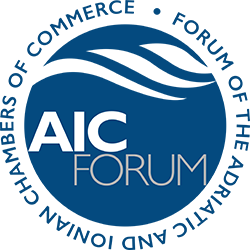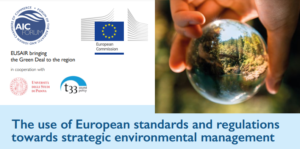EUSAIR bringing the Green Deal to the Region
The use of European standards and regulations towards strategic environmental management”
Second of a series of three workshops organized by Forum of the Adriatic and Ionian Chambers of Commerce, in collaboration with the University of Padua.
These Workshops are financed by DG REGIO in the context of the project “EUSAIR bringing the Green Deal to the region”, which aims to support the adoption of more sustainable practices in the organization of EUSAIR meetings.
This second workshop will present the structure of environmental standards and their potential application into Green Public Procurement (GPP). It will help participants better understand procedures, environmental management standards and EU Environmental schemes such as EMAS regulations.
Finally, the aim is also to encourage the EUSAIR community to take part in the ‘Big Buyers for Climate and Environment’ initiative, which facilitates exchanges among buyers committed to GPP implementation.
PROGRAM
Moderated by Eleonora Tramannoni, Executive Officer Forum of the Adriatic and Ionian Chambers of Commerce
- “The role of Standards within GPP procedures: informed choices for sustainable procurement”
Alessandro Manzardo, Professor of Strategic Environmental Management, University of Padua - “Big Buyers for Climate and Environment – promoting collaboration between big public buyers in implementing strategic public procurement for sustainable solutions”
Simon Clement, Senior Coordinator Sustainable Economy and Procurement, ICLEI Europe – Local Governments for Sustainability, European Secretariat - “The strategy of Veneto Region in the GPP promotion and dissemination”
Giulia Tambato, Purchasing Manager Direzione Acquisti e AA.GG., Veneto Region
REPORT
In the framework of the Project “EUSAIR bringing the Green Deal to the region”, the Forum of the Adriatic and Ionian Chambers of Commerce, in collaboration with the University of Padua, has organized on December 13th 2021 the second of a series of three online webinars financed by DG REGIO, with the aim of supporting the adoption of more sustainable practices in the organization of EUSAIR meetings.
This second webinar, entitled “the use of European standards and regulations towards strategic environmental management”, has introduced participants to the structure of environmental standards and their potential application into Green Public Procurement (GPP), thus helping them to better understand procedures, environmental management standards and EU Environmental schemes such as EMAS regulations. Ultimately, the aim was to encourage the EUSAIR community to take part in the “Big Buyers for Climate and Environment” initiative, which facilitates exchanges among buyers committed to GPP implementation.
Eleonora Tramannoni, Executive Officer Forum of the Adriatic and Ionian Chambers of Commerce, moderated the event and opened the meeting with a quick summary of what emerged during the first webinar, where the objective was to build a common understanding of environmental issues, exploring the link between EU policies, programs and regulations, as well as production and consumption patterns.
The first speaker of the second webinar was Alessandro Manzardo, Professor of Strategic Environmental Management, University of Padua, with an intervention entitled “The role of Standards within GPP procedures: informed choices for sustainable procurement”. Moving forward from a very useful overview on the topic, he focused on the following questions: ”how can we actually implement GPP within different organizations?”; “ how can a company support the development of products and services in compliance with GPP?”
GPP is not just a European way of developing sustainable production and consumption practices, but it’s something that has been agreed on all over the world, at least in terms of contents and ideas. Europe is at the forefront of this process and has set a strategic framework for the rest to follow. Prof. Manzardo presented the main actors involved in the GPP actions: Public Bodies, which are responsible to adopt Minimum Environmental Criteria and promote Green Public Procurement Procedures; Designers, who are those individuals or groups that develop proposals in compliance with Minimum Environmental Criteria; and Companies producing products or delivering services in compliance with Minimum Environmental Criteria.
But how can anyone know if a product or service is in compliance with these criteria? The answer is ECOLABELSlabelling. ECOLABELS are meant to inspire trust and they do so by certifying that certain requirements related to GPP are met by the organizations showing these labels. Moreover, international standards offer further guidance by setting the agreed common standards and rules.
It is possible to check if a company is certified by looking at accreditation bodies’ websites and the updated list of all companies that have obtained the certification through them (e.g. for ISO 14001). Alternatively, we can find the register with all the companies (e.g. for EMAS) in the dedicated section of the European Union website in the dedicated section.
The second speaker was Simon Clement, Senior Coordinator Sustainable Economy and Procurement, ICLEI Europe – Local Governments for Sustainability, European Secretariat, with an intervention entitled “Big Buyers for Climate and Environment – promoting collaboration between big public buyers in implementing strategic public procurement for sustainable solutions”. He introduced the Big Buyers initiative, which fosters collaboration between Big Buyers in Europe in strategic Public Procurement to help drive the market for innovative and sustainable goods and services. The initiative has now been running for three years and it has foreseen the development of working groups on specific areas of interest such as zero-emissions construction sites, digital solutions in the healthcare sector, circular construction and electric heavy-duty vehicles.
The groups are generally composed by 5/10 public purchasing bodies (big buyers) together with expert support organizations and multipliers, and they carry out many activities. Among them, exchange of best practice, joint market engagement, research on the latest technical developments, joint development of procurement criteria and strategies. These are closed working groups, so there’s no possibility to join, but there is the possibility to join an observer group that provides the opportunity to follow the journey of the initiative and participate in many dedicated events.
The third and last speaker was Giulia Tambato, Purchasing Manager Direzione Acquisti e AA.GG. Veneto Region, with her intervention on “The strategy of Veneto Region in the GPP promotion and dissemination”. She presented the actions of Regione Veneto in support of the GPP. In 2015 there was the first approval of a regional action plan for its implementation spread over a three year period, and then in 2019 the approval of a second action plan valid until 2023. The aim was to focus on the dissemination of the GPP policies at a local level in order to promote the use of renewable resources, keeping in mind the main goals of reduction of CO2 emissions and waste production.
Collaboration between stakeholders has proven to be the most efficient way to reach these goals, both at the local, regional and international level. There is still a long way to go – says Ms. Tambato – but Regione Veneto is trying to do its part as a public institution, also by putting in place specific communication tools, such as a dedicated website, newsletters and online education platforms. They also organize dedicated events (Compraverde BuyGreen Veneto Forum and GPP Awards) and have signed a Memorandum of Understanding (MoU) on GPP in 2019, in order to create a common focus on sustainability and innovation in procurement with the other public buyers of the region, local universities, regional agency on environmental protection and the representative body of the local chambers of commerce (UNIONCAMERE VENETO). The main goals of the 2019 MoU are: promoting GPP in the territory, creating positive synergies among institutions that operate in the region, activating thematic working groups to draft steering documents for the regional and national territory.
Q&A
- Is there a GPP plan for the Agriculture Sector (as the one cited for the construction sector)?
Simon Clement answered positively to this question. GPP can be applied to many sectors, Food and Catering surely has got working groups collaborating on the development of GPP practices. Navigating the links he provided during his intervention could be useful to find more information related to a specific sector.
- How can we make consumers buy more products with ecolabels and how can we help them understand which label is trustworthy?
Manzardo answered that we should already start from schools, because teaching these kinds of things should be of primary importance since that’s the direction we all will have to take in the future. Environmental protection, recycling, sustainability, de-carbonization are concepts that kids can understand and that represent a priority for the future.
- Do you think there is a link between the number of certifications in Europe and GPP?
Manzardo said there are no studies about that, but he thinks that there is indeed a link. Clement agreed and added that he actually had an experience of a public body which introduced a clause to some of their contracts asking for certifications and the contractors started to get certified within a couple of years.
- Are different ECOLABELS weighted differently?
Clement replied that there are very clear guidelines and legal regulations specifying how to use ECOLABELS in official documents and those references define the type and nature of the label itself.
Manzardo added that ECOLABELS are different from one another, so they are necessarily weighted differently. In this sense, it is not always possible to determine that one is better than the other. Yet, they are all based on standards and in that sense they are equal.
- Is there a cost for the implementation of GPP?
Manzardo answered that the real costs we should be thinking about are the costs of not implementing the GPP. The real costs are related to the consequences of environmental disaster we could face in the future. Clement agreed with Prof. Manzardo.
Finally, Prof. Manzardo made some final remarks and concluded the webinar with the following words: “Last time we were able to analyze the topic of GPP from different perspectives, EUSAIR, Italy and Lombardy Region. We saw that GPP is already practical and can already be applied.
Well, today we had the confirmation; since we saw that the involvement of different parties is essential to make the shift towards a more sustainable economy a reality, even if GPP is not mandatory, we are starting to understand that we need it.”
If you are interested in knowing more about the topic and join the debate, don’t miss the next webinar. Stay in touch and follow us for updates!




